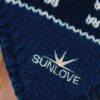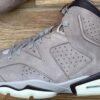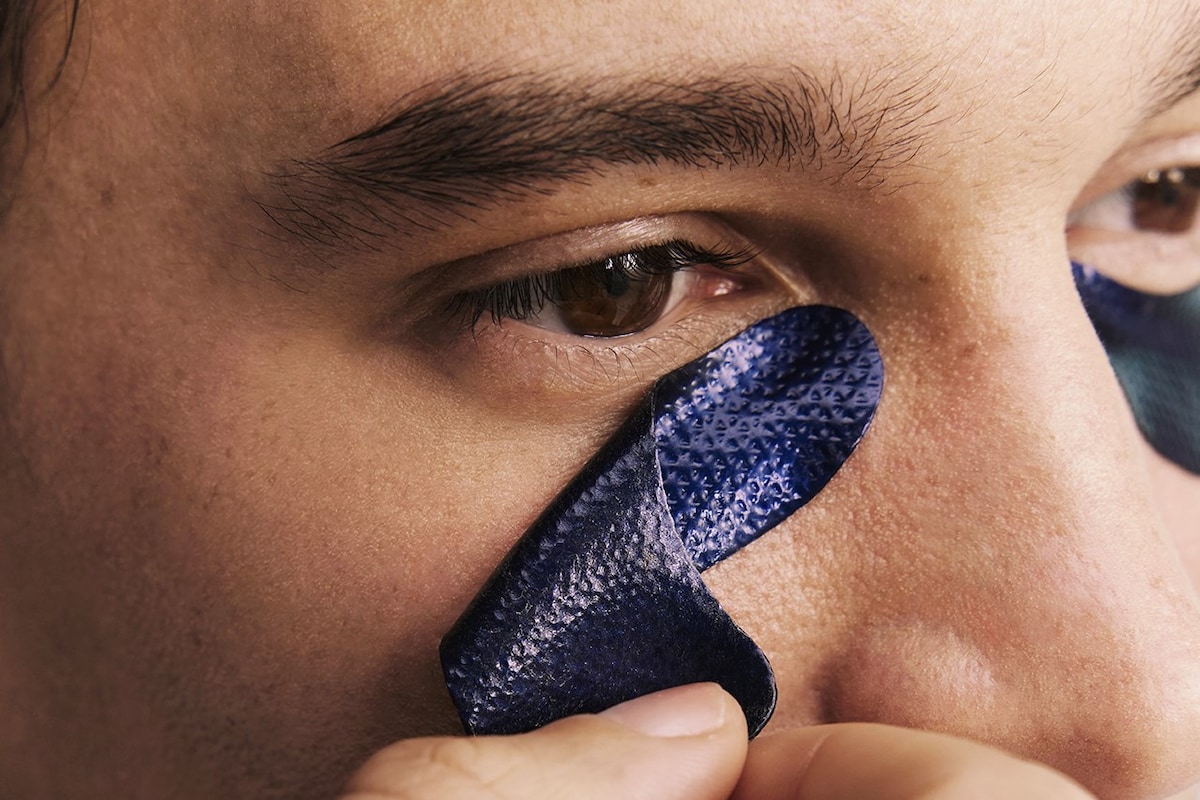
Rewrite
Founded in France a decade ago, Horace has become the country’s number one men’s skincare brand. Now, its sights are set further afield
-
Who is it? Horace is France’s leading men’s skincare brand, co-founded by Marc Briant-Terlet to offer simple, effective and inclusive products without macho posturing
-
Why do I want it? Horace makes high-performance, unfussy skincare and fragrances that solve real concerns with straightforward formulas and natural ingredients
-
Where can I find it? You can shop Horace at 19 stores across France, their London Covent Garden location or directly from their website
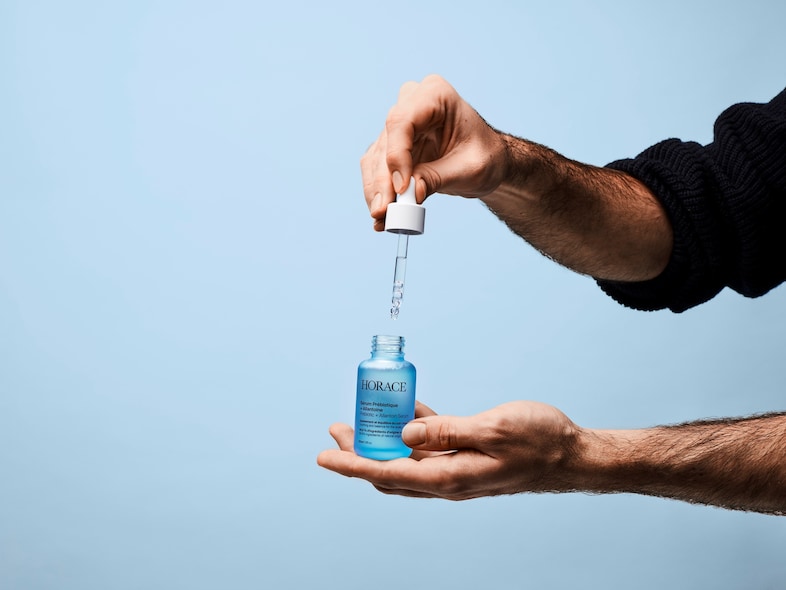
Who is it? Any skincare devotee will tell you that France is a global Mecca for skincare. The green neon glow of the country’s parapharmacies has become a beacon for beauty pilgrims, their baskets overflowing with culty creams and pharmacist-recommended elixirs before the Eurostar home. It’s not that the products have a certain je ne sais quoi. Stacked with dermatologist-approved formulas that soothe rather than sizzle, they come with in-house pharmacists ready to offer advice that prioritises skin health over hype. No wonder fashion week veterans pack an empty tote just for the loot.
Crucially, beauty isn’t just a women’s enterprise anymore. The global men’s skincare market has been steadily bulking up, growing by 10% annually, thanks to wellness culture’s TikTok-fuelled ‘looksmaxxing’, where teenage boys chisel their faces into Greek statuary with acids and serums. Into this cultural moment stepped Marc Briant-Terlet, co-founder of Horace, who entered the men’s skincare market a decade ago with a simple proposition: products for men that work, without the so-macho theatrics.
Terlet grew up in Melun, a working-class suburb south-east of Paris, where his mother – a midwife – raised three children on her own. “She had to juggle everything,” he says. “It taught me resilience. The sense that you just have to make things work.” That inherited pragmatism would shape his winding path through business school, fashion, and eventually, beauty. At his mother’s encouragement, he enrolled in business school and relocated to Montreal. “I fell in love with consumer behaviour,” he says. “I saw how social science could explain how we live, and why we buy.” He wrote for GQ and Clark – an early street culture magazine, which may explain why the Horace logo looks like it belongs to a men’s quarterly – and by the age of 22, was running marketing at Vans France. He later launched a consultancy working with brands like Comme des Garçons and Google.
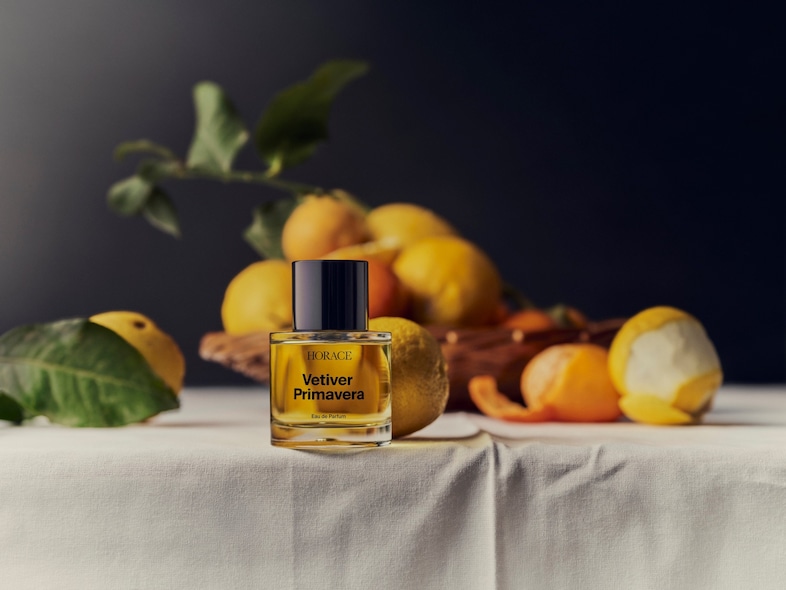
But something was missing. “I was into grooming and fragrance as a teen, but I couldn’t find anything I liked. It was either super expensive or overly masculine in this sort of basic, macho way. I didn’t want that.” In 2015, he co-founded Horace with his business partner Kim Mazzilli with a goal to create something simple, easy to use and free from the weird gender theatre. Inclusivity wasn’t a postscript – it was core to the brand from day one. “Most of my friends growing up weren’t white. My little brother is transgender. I wanted people I grew up with to be visible in the brand – in our advertising, in our imagery.” The messaging is a world away from those campaigns of buffed-up homoerotic sailors diving in pools, or the ones of oily men being pawed by perfomatively horny bikini-clad women.
Turns out, men don’t need the promise of getting laid to buy face cream after all. Today, Horace is France’s leading men’s skincare brand with the country’s fastest-selling fragrances. It has 19 stores across France and a sleek London outpost that opened last year. The company’s ethos hasn’t changed much – it’s still simple and inclusive, still suspicious of fluff.
Why do I want it? “We use simple language – not basic, but high-quality simplicity,” explains Terlet, who believes accessibility doesn’t stop at casting. “Beauty shouldn’t be technical or intimidating. It’s about looking good and feeling good – it should be easy.” Their products reflect this ethos. Serums, moisturisers, and cleansers that speak directly to everyday concerns – dryness, blemishes, redness – without overwhelming the customer with an irritating 20-step routine or science lab chemical trivia. “If you have blemishes, we have two products: a chemical exfoliant and a serum. One reduces, one prevents. That’s it.”
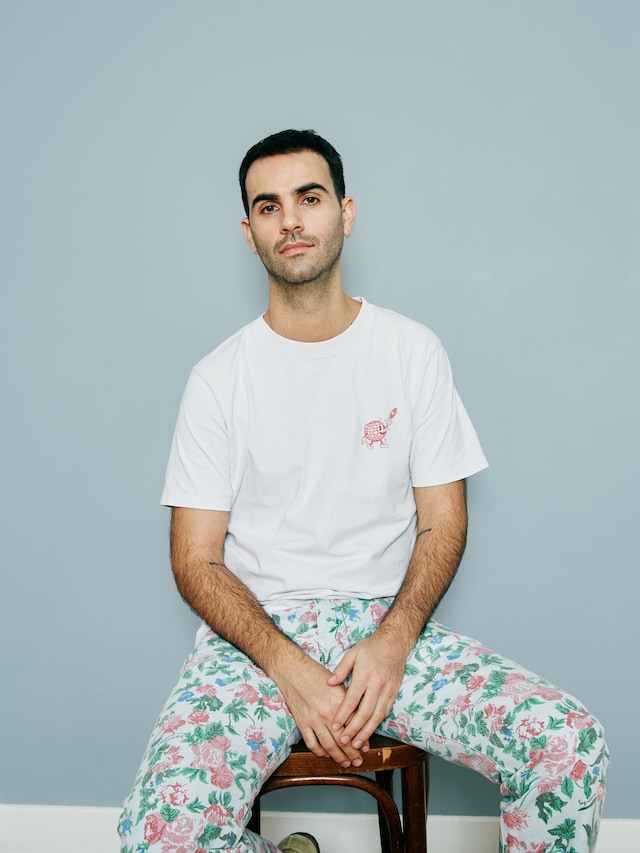
Even the product development model is inverted. Horace is direct-to-consumer in both distribution and ideology. “We don’t do focus groups or big marketing tests. We just talk to customers. We send them samples. We listen,” says Terlet, who regularly speaks with customers over Instagram DM. But the listening is formalised too: they maintain a database of over 6,000 clients, each logged with detailed skin concerns. When a new product is prototyped, it’s sent out to 25 people who match the use case. “We iterate quickly. From idea to production, it takes about six months. For skincare, that’s fast.”
Many of Horace’s formulas are at least 95% naturally derived, and their ingredient lists read like they belong in an expensive salad: prickly pear oil, murumuru butter, red ginseng, sapote butter, binchotan charcoal. Even their cleansers rely on coconut-derived surfactants that clean without stripping the skin.
The products have been good enough to convince many men to add an extra step or two into their morning routines – and that’s saying something. “When we launched our first serum in 2020, I didn’t know how men would respond,” he admits. “But now it’s one of our best-sellers. Especially in the UK – guys are obsessed with under-eye masks.” The success hinges on performance. Those serums absorb quickly, moisturisers feel weightless, and exfoliants manage to be effective without being harsh. Each extra step is unfussy, well-suited to the reluctant man. “Skincare can feel like one more thing in the morning, so combining steps helps. Men will do it, but it has to be easy.” As such, their SPF30 moisturiser is the brand’s top performer in the UK. Their fragrances follow the same logic. Rose, Oud, and Noir are among the most popular, each one distinctive but easy to wear. Scents feel well-considered and modern, and come without the aggressive branding.
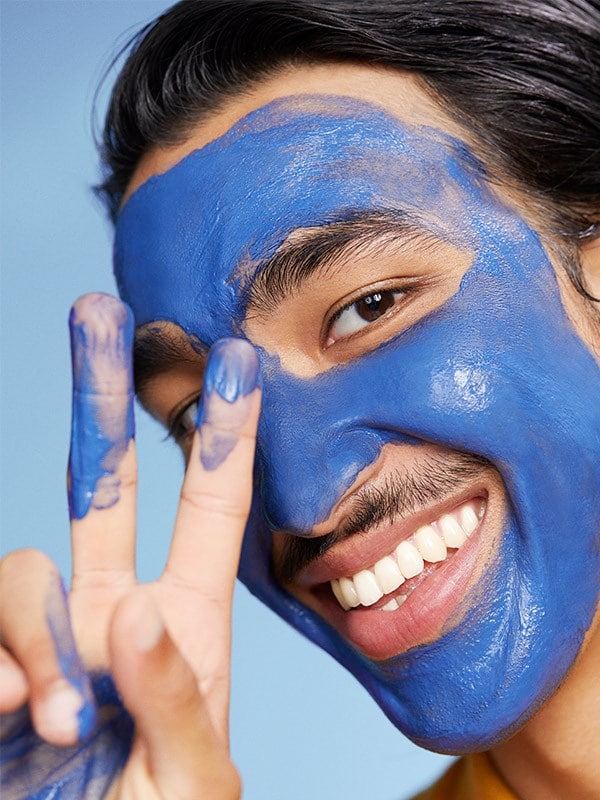
There’s a rare clarity to Horace’s approach: direct, well-reasoned and refreshingly free of beauty-world jargon. “We always design products for someone who’s never used skincare before,” says Terlet. “It has to make sense immediately.” That instinct – to explain without condescending, to elevate without alienating – has earned the brand its cult status in France, and a slow but sure foothold in the UK. “We want men to feel good about themselves,” Terlet says. “That’s the whole point.”
Where can I find it? Horace products are available for purchase at 19 stores in France, one in London’s Covent Garden, and via their website.
in HTML format, including tags, to make it appealing and easy to read for Japanese-speaking readers aged 20 to 40 interested in fashion. Organize the content with appropriate headings and subheadings (h1, h2, h3, h4, h5, h6), translating all text, including headings, into Japanese. Retain any existing
tags from
Founded in France a decade ago, Horace has become the country’s number one men’s skincare brand. Now, its sights are set further afield
-
Who is it? Horace is France’s leading men’s skincare brand, co-founded by Marc Briant-Terlet to offer simple, effective and inclusive products without macho posturing
-
Why do I want it? Horace makes high-performance, unfussy skincare and fragrances that solve real concerns with straightforward formulas and natural ingredients
-
Where can I find it? You can shop Horace at 19 stores across France, their London Covent Garden location or directly from their website

Who is it? Any skincare devotee will tell you that France is a global Mecca for skincare. The green neon glow of the country’s parapharmacies has become a beacon for beauty pilgrims, their baskets overflowing with culty creams and pharmacist-recommended elixirs before the Eurostar home. It’s not that the products have a certain je ne sais quoi. Stacked with dermatologist-approved formulas that soothe rather than sizzle, they come with in-house pharmacists ready to offer advice that prioritises skin health over hype. No wonder fashion week veterans pack an empty tote just for the loot.
Crucially, beauty isn’t just a women’s enterprise anymore. The global men’s skincare market has been steadily bulking up, growing by 10% annually, thanks to wellness culture’s TikTok-fuelled ‘looksmaxxing’, where teenage boys chisel their faces into Greek statuary with acids and serums. Into this cultural moment stepped Marc Briant-Terlet, co-founder of Horace, who entered the men’s skincare market a decade ago with a simple proposition: products for men that work, without the so-macho theatrics.
Terlet grew up in Melun, a working-class suburb south-east of Paris, where his mother – a midwife – raised three children on her own. “She had to juggle everything,” he says. “It taught me resilience. The sense that you just have to make things work.” That inherited pragmatism would shape his winding path through business school, fashion, and eventually, beauty. At his mother’s encouragement, he enrolled in business school and relocated to Montreal. “I fell in love with consumer behaviour,” he says. “I saw how social science could explain how we live, and why we buy.” He wrote for GQ and Clark – an early street culture magazine, which may explain why the Horace logo looks like it belongs to a men’s quarterly – and by the age of 22, was running marketing at Vans France. He later launched a consultancy working with brands like Comme des Garçons and Google.

But something was missing. “I was into grooming and fragrance as a teen, but I couldn’t find anything I liked. It was either super expensive or overly masculine in this sort of basic, macho way. I didn’t want that.” In 2015, he co-founded Horace with his business partner Kim Mazzilli with a goal to create something simple, easy to use and free from the weird gender theatre. Inclusivity wasn’t a postscript – it was core to the brand from day one. “Most of my friends growing up weren’t white. My little brother is transgender. I wanted people I grew up with to be visible in the brand – in our advertising, in our imagery.” The messaging is a world away from those campaigns of buffed-up homoerotic sailors diving in pools, or the ones of oily men being pawed by perfomatively horny bikini-clad women.
Turns out, men don’t need the promise of getting laid to buy face cream after all. Today, Horace is France’s leading men’s skincare brand with the country’s fastest-selling fragrances. It has 19 stores across France and a sleek London outpost that opened last year. The company’s ethos hasn’t changed much – it’s still simple and inclusive, still suspicious of fluff.
Why do I want it? “We use simple language – not basic, but high-quality simplicity,” explains Terlet, who believes accessibility doesn’t stop at casting. “Beauty shouldn’t be technical or intimidating. It’s about looking good and feeling good – it should be easy.” Their products reflect this ethos. Serums, moisturisers, and cleansers that speak directly to everyday concerns – dryness, blemishes, redness – without overwhelming the customer with an irritating 20-step routine or science lab chemical trivia. “If you have blemishes, we have two products: a chemical exfoliant and a serum. One reduces, one prevents. That’s it.”

Even the product development model is inverted. Horace is direct-to-consumer in both distribution and ideology. “We don’t do focus groups or big marketing tests. We just talk to customers. We send them samples. We listen,” says Terlet, who regularly speaks with customers over Instagram DM. But the listening is formalised too: they maintain a database of over 6,000 clients, each logged with detailed skin concerns. When a new product is prototyped, it’s sent out to 25 people who match the use case. “We iterate quickly. From idea to production, it takes about six months. For skincare, that’s fast.”
Many of Horace’s formulas are at least 95% naturally derived, and their ingredient lists read like they belong in an expensive salad: prickly pear oil, murumuru butter, red ginseng, sapote butter, binchotan charcoal. Even their cleansers rely on coconut-derived surfactants that clean without stripping the skin.
The products have been good enough to convince many men to add an extra step or two into their morning routines – and that’s saying something. “When we launched our first serum in 2020, I didn’t know how men would respond,” he admits. “But now it’s one of our best-sellers. Especially in the UK – guys are obsessed with under-eye masks.” The success hinges on performance. Those serums absorb quickly, moisturisers feel weightless, and exfoliants manage to be effective without being harsh. Each extra step is unfussy, well-suited to the reluctant man. “Skincare can feel like one more thing in the morning, so combining steps helps. Men will do it, but it has to be easy.” As such, their SPF30 moisturiser is the brand’s top performer in the UK. Their fragrances follow the same logic. Rose, Oud, and Noir are among the most popular, each one distinctive but easy to wear. Scents feel well-considered and modern, and come without the aggressive branding.

There’s a rare clarity to Horace’s approach: direct, well-reasoned and refreshingly free of beauty-world jargon. “We always design products for someone who’s never used skincare before,” says Terlet. “It has to make sense immediately.” That instinct – to explain without condescending, to elevate without alienating – has earned the brand its cult status in France, and a slow but sure foothold in the UK. “We want men to feel good about themselves,” Terlet says. “That’s the whole point.”
Where can I find it? Horace products are available for purchase at 19 stores in France, one in London’s Covent Garden, and via their website.
and integrate them seamlessly into the new content without adding new tags. Ensure the new content is fashion-related, written entirely in Japanese, and approximately 1500 words. Conclude with a “結論” section and a well-formatted “よくある質問” section. Avoid including an introduction or a note explaining the process.
